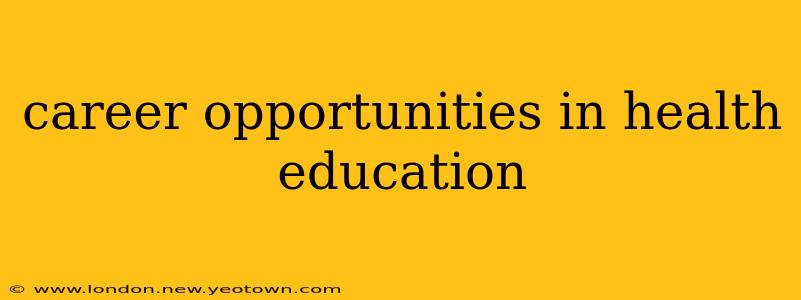The world of health education is a vibrant tapestry woven with countless threads of opportunity. It's a field where passion for improving lives intersects with the power of knowledge, offering rewarding careers for those who want to make a real difference. My journey into health education began with a simple desire – to help people live healthier, happier lives. What started as a volunteer role blossomed into a fulfilling career, and I'm excited to share the diverse paths this field offers.
What is Health Education?
Before diving into the career paths, let's define the core: health education focuses on empowering individuals and communities to make informed decisions that promote well-being. This involves teaching about healthy lifestyles, disease prevention, and effective healthcare management. It’s not just about imparting facts; it’s about fostering behavior change and building healthier habits.
What are the different career paths in health education?
The beauty of health education lies in its versatility. The opportunities aren't confined to a single role; they span a vast spectrum, each unique and impactful. Let's explore some key career paths:
1. Health Educator:
This is the cornerstone role. Health educators work in various settings—schools, hospitals, community centers, workplaces, and even government agencies. They design and deliver educational programs, develop health promotion materials, and conduct health assessments. My own journey started here, working with school children on nutrition and physical activity. The satisfaction of seeing children embrace healthier habits was incredibly rewarding.
2. Community Health Worker:
These individuals serve as the bridge between healthcare systems and underserved communities. They provide health education, outreach, and support to populations facing health disparities, often acting as advocates and liaisons. They might help individuals navigate healthcare systems, connect them with resources, or simply offer a listening ear and crucial support.
3. Public Health Educator:
This path takes a broader perspective, focusing on population-level health improvement. Public health educators develop and implement large-scale health campaigns, analyze health data, and advocate for policies that promote public health. Their work has a significant societal impact, shaping public health initiatives on a national or even international scale.
4. Health Promotion Specialist:
Health promotion specialists work to create environments that support healthy choices. They may design workplace wellness programs, create campaigns aimed at reducing risk factors for chronic diseases, or develop marketing materials that promote healthy behaviors. They’re the strategists behind making healthy choices the easier and more appealing option.
5. Health Communication Specialist:
Effective communication is crucial in health education. Health communication specialists work to translate complex health information into easily understandable formats for various audiences. They utilize various channels—social media, websites, brochures, videos—to reach their target population effectively and spread critical health messages.
What skills are needed for a career in health education?
Regardless of the specific path you choose, several crucial skills will enhance your success:
- Strong communication skills: The ability to convey complex information clearly and concisely is paramount.
- Interpersonal skills: Building rapport and trust with individuals and communities is essential for effective health education.
- Program planning and evaluation skills: Designing and implementing programs that are both effective and sustainable requires strong organizational and evaluation abilities.
- Cultural competency: Understanding and respecting diverse cultural beliefs and practices is vital when working with varied populations.
- Data analysis skills: Understanding and interpreting health data is crucial for informing program development and evaluation.
What educational qualifications are necessary?
Most health education positions require at least a bachelor's degree, often in health education, public health, or a related field. A master's degree can open doors to leadership roles and specialized areas of expertise. Certifications can also enhance your qualifications and demonstrate your commitment to the profession.
What is the job outlook for health education professionals?
The demand for health education professionals is strong and expected to grow, driven by the increasing need to address chronic diseases, promote preventative care, and improve overall population health. The job market offers various avenues for career growth and specialization.
How much can I earn as a health educator?
Salaries vary greatly depending on the specific role, location, experience, and educational qualifications. However, it's a field that offers competitive compensation alongside immense personal and professional rewards.
The journey into health education is one of continuous learning and profound impact. It's a career path where you can blend your passion for helping others with your professional skills, making a tangible difference in people's lives and the health of communities. So, if you’re looking for a career that combines purpose with professional fulfillment, consider exploring the world of health education – it might just be the perfect fit for you.

